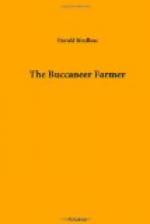“We’re right,” he said. “They’ve gone through the broken wall and the dogs are holding them at the top of the force.”
A few minutes afterwards he scrambled over a pile of fallen stones, shouted to Tom, and began to run, for he understood what had happened. The broken wall marked the boundary of the Mireside heaf and the sheep were now on familiar ground. It was his business to drive them to the farm, but they were trying to turn off to look for shelter among the crags. At the force, where the Bleatarn beck leaps in linked falls to the valley, one could get down between the water and the rocks; on the other side, a path about a foot wide led across the face of a precipice. In daylight, if the stones were dry, a man with steady nerves could use the path, but when slab and scree were packed with snow nothing but a Herdwick could cross it safely. The dogs knew this and were trying to hold the flock.
When the men came up they saw an indistinct, woolly mass on the other side of the beck. The mass was not level but slanted sharply, and the sheep at the bottom sent down showers of stones as they surged to and fro, with heads turned to the dogs. It was obvious that they did not mean to go down the ghyll, and Herdwicks born among the crags can climb where no dog can follow.
“The dogs canna turn them,” gasped Tom. “They’ll be away ower Eel Scar; they’re brekkin’ noo.”
The flock began to open out and three or four sheep straggled forward, but Kit’s bob-tailed dog slid down a snowy slab and fell upon the first. The sheep ran back, but the others stood and Kit saw the dog could not stop them long. The Herdwicks knew the advantage was theirs on ground like this.
Jumping from a boulder, he fell into the swollen beck and made his way up the nearly perpendicular slab. At the top he found a dangerous ledge and advanced upon the sheep, which had their backs to the stream. Twining his fingers in a lamb’s wool, he picked up the animal and balancing himself precariously threw it as far as he could. It fell into the beck and scrambled out on the other side, where the track led down the ghyll. The effort had cost him much, for his heart beat and he gasped for breath, but he doubted if he had done enough. Dragging another lamb from the flock, he hurled it into the water, and then his foot slipped and he rolled down the slab and fell in the snow.
He got up, badly shaken, and saw that his plan had worked. Sheep will follow a leader and the flock was straggling down the ghyll behind the lambs. Kit recrossed the beck and descended cautiously, keeping close to the rocks. The ghyll is a rough climb in daylight, and summer tourists, trying to cross the fells, often turn back at the bottom. There is no path and one scrambles over large, sharp stones, some of which are loose and fall at a touch. In places, banks of treacherous gravel drop to the beck, which plunges over ledges into deep, spray-veiled pools. Now the stones were slippery with snow, the wind raged, and mist and tossing flakes hid the ground a few yards ahead.




